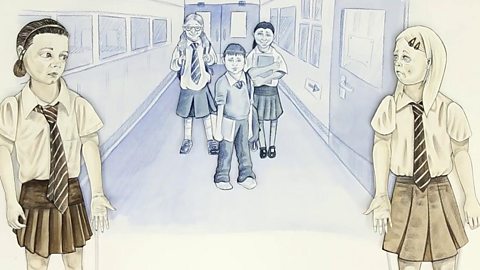Article summary
An article for students, giving them tips and advice on what to do if they are being bullied.
5 Things to do if you are getting bullied
Anyone can experience bullying. Whether it happens in person or online, between friends or anonymously, occasionally or every day – bullying can wear you down and make you feel powerless.
But you can take control. If someone’s behaviour is making you feel sad, upset or anxious, there are practical things you can do to get help and feel better.

1. Tell someone what’s happening
It’s much more difficult to deal with bullying on your own; and bullies rely on your silence to protect them.
It’s really important to tell a trusted adult – it can be a teacher, a parent or other family member – what’s happening and how it’s making you feel.
It doesn’t matter if it’s happening IRL or online, if it’s a friend or a stranger; getting it out in the open is the first step to things getting better.
2. Write it down
Sometimes bullying isn’t one dramatic thing; it can be lots of little words or actions, or just the way a person makes you feel over time.
If you’re finding it hard to explain what’s going on, it can really help to keep a note of every time something nasty or uncomfortable happens.
Save messages; screen-shot online meanness; write a note in your phone to remember when something happened and how you felt. That way you can keep track of bullying behaviour and, when you speak to a trusted adult, you can give examples to help them understand.
3. Block and report
Websites, messaging services and social media platforms have a responsibility to protect you from bullying.
If someone is hassling or targeting you online, or sending you horrible messages, block them. You don’t need to put up with that.
Each service should have a way to report bad behaviour; so hit the report button – that’s what it’s there for!
If going somewhere online makes you feel uncomfortable or unhappy, limit your time there or just stay away; try to make sure the spaces where you’re hanging out – whether on or offline – feel safe and supportive.
4. Focus on you
It can be easy for a bully to take up too much of your headspace – you spend too much time feeling upset or worried.
But bullies don’t deserve your time.
There are so many amazing things about you (there really are!), so focus on being kind to yourself and the things that make you happy. Play some games, look through photos of good times, connect with a good friend and have a laugh.
5. Get expert advice
If you’re experiencing bullying, there are lots of places online where you can get help and advice. Childline offers counselling online and on the phone or check out Anti-Bullying Alliance.
No one deserves to be bullied, and no one should go through it alone. Reach out, get help, and things will get better.
If your students need support
You should always tell someone about the things you’re worried about. You can tell a friend, parent, guardian, teacher, or another trusted adult. If you're struggling with your mental health, going to your GP can be a good place to start to find help. Your GP can let you know what support is available to you, suggest different types of treatment and offer regular check-ups to see how you’re doing.
If you’re in need of in-the-moment support you can contact Childline, where you can speak to a counsellor. Their lines are open 24 hours a day, 7 days a week.
More on: Managing online information
How to stop bullying. document
An article providing practical solutions for anyone experiencing bullying.

Bullying - how to ask for help. video
Children talk about their experiences of speaking up and getting help with bullying.

Are you being cyberbullied? video
A video about a girl called Abbie, who is being bullied online.
